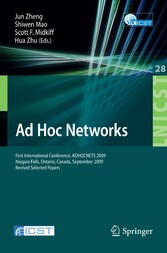Suchen und Finden
Ad Hoc Networks. Lecture Notes of the Institute for Computer Sciences, Social-Informatics and Telecomm. Eng. Vol 28 - First International Conference, ADHOCNETS 2009, Niagara Falls, Ontario, Canada, September 22-25, 2009. Revised Selected Papers
Mehr zum Inhalt

Ad Hoc Networks. Lecture Notes of the Institute for Computer Sciences, Social-Informatics and Telecomm. Eng. Vol 28 - First International Conference, ADHOCNETS 2009, Niagara Falls, Ontario, Canada, September 22-25, 2009. Revised Selected Papers
This volume constitutes the refereed proceedings of the First International Conference on Ad Hoc Networks, held in Niagara Falls, Ontario, Canada, in September 2009. The 62 revised full papers presented were carefully reviewed. Ad hoc networks refer to the wireless networking paradigm that covers a variety of network forms for specific purposes, such as mobile ad hoc networks, sensor networks, vehicular networks, underwater networks, underground networks, personal area networks, and home networks. The various forms of ad hoc networks promise a broad scope of applications in civilian, commercial, and military areas, which have led to significant new research problems and challenges, and have attracted great efforts from academia, industry, and government. This unique networking paradigm necessitates re-examination of many established wireless networking concepts and protocols, and calls for developing new fundamental understanding of problems such as interference, mobility, connectivity, capacity, and security, among others. While it is essential to advance theoretical research on fundamentals and practical research on efficient algorithms and protocols, it is also critical to develop useful applications, experimental prototypes, and real-world deployments to achieve a practical impact on our society for the success of this networking paradigm.
Alle Preise verstehen sich inklusive der gesetzlichen MwSt.






